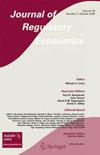Compliance and competition with heterogeneous service providers: the federal Lifeline program
IF 1.4
4区 经济学
Q3 ECONOMICS
引用次数: 2
Abstract
This paper studies how compliance behavior varies across competing service providers in the Lifeline phone subsidy program and assesses whether enlarging the set of providers improves program outcomes. In markets where firms compete to provide government benefits or services directly to individuals, the most productive firms—in terms of service quality or operating costs—survive and serve the market. However, imperfect enforcement of program rules may weaken competitive pressures through non-compliance, allowing less productive firms to maintain market share. I exploit institutional features of the Lifeline program, state-level variation in regulatory environments and a one-time reform, to empirically document the importance of provider heterogeneity following a 2008 expansion of Lifeline. The presence of low-compliance providers in particular markets drives the largest state-level differences in wasteful or inefficient program spending. Qualitatively, these providers appear to select into state markets with looser enforcement of program rules. In counterfactual simulations, excluding low-compliance providers prevents 500,000 ineligible enrollments, while only reducing eligible enrollments by 100,000. Further restrictions come at a higher cost, reflecting the trade-off of compliance and competition.与异质服务提供者的合规性和竞争:联邦生命线计划
本文研究了生命线电话补贴计划中竞争服务提供商的合规行为如何变化,并评估了扩大供应商群体是否能改善计划结果。在企业竞争直接向个人提供政府福利或服务的市场中,就服务质量或运营成本而言,生产力最高的企业能够生存下来并为市场服务。然而,项目规则的执行不完善可能会因不遵守而削弱竞争压力,使生产率较低的公司能够保持市场份额。我利用生命线计划的制度特征、监管环境的州级变化和一次性改革,从经验上证明了2008年生命线扩张后提供者异质性的重要性。低合规性供应商在特定市场的存在导致了浪费或低效项目支出的最大州级差异。从质量上讲,这些供应商似乎选择了对项目规则执行较宽松的州市场。在反事实模拟中,排除低合规性提供商可以防止500000名不合格的注册,而只会将合格的注册减少100000名。进一步的限制会带来更高的成本,反映出合规性和竞争性之间的权衡。
本文章由计算机程序翻译,如有差异,请以英文原文为准。
求助全文
约1分钟内获得全文
求助全文
来源期刊

Journal of Regulatory Economics
ECONOMICS-
CiteScore
2.40
自引率
0.00%
发文量
14
期刊介绍:
Recent legislative and policy reforms have changed the nature of regulation. Partial deregulation has created a new dimension to regulatory problems, as the debate is extended to include diversification and new forms of regulation. The introduction of incentive-based rate schedules and ratemaking procedures, the integration of demand-side programs with planning for capitol expansion, and other developments, raise a host of theoretical and empirical questions. The Journal of Regulatory Economics serves as a high quality forum for the analysis of regulatory theories and institutions by developing the rigorous economics foundations of regulation. Both theoretical and applied works, including experimental research, are encouraged. Research in all aspects of regulation is of interest including traditional problems of natural monopoly, antitrust and competition policy, incentive regulation, deregulation, auction theory, new policy instruments, health and safety regulation, environmental regulation, insurance and financial regulation, hazardous and solid waste regulation, universal service obligation, and consumer product regulation. The JRE provides researchers, policy-makers, and institutions with current perspectives on the theory and practice of economics of regulation. While there are a number of journals and magazines that include the study of regulation, the JRE is unique in that it fills a gap in the market for a high quality journal dealing solely with the economics of regulation.Officially cited as: J Regul Econ
 求助内容:
求助内容: 应助结果提醒方式:
应助结果提醒方式:


